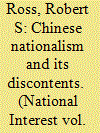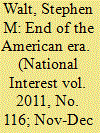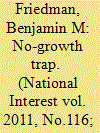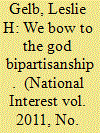| Srl | Item |
| 1 |
ID:
110689


|
|
|
|
|
| Publication |
2011.
|
| Summary/Abstract |
AT NO time since the end of the Cold War have U.S.-China relations been worse. Yes, in the past there have been periodic confrontations over Taiwan, and tensions over the American bombing of the Chinese embassy in Belgrade and the Chinese fighter-jet collision with an American reconnaissance plane over the South China Sea. But the current downturn reflects a potential long-term trend with the likelihood of protracted strategic conflict. Equally troubling, this raising of tensions is not only unnecessary but also potentially costly to the United States.
|
|
|
|
|
|
|
|
|
|
|
|
|
|
|
|
| 2 |
ID:
110685


|
|
|
|
|
| Publication |
2011.
|
| Summary/Abstract |
THE UNITED States has been the dominant world power since 1945, and U.S. leaders have long sought to preserve that privileged position. They understood, as did most Americans, that primacy brought important benefits. It made other states less likely to threaten America or its vital interests directly. By dampening great-power competition and giving Washington the capacity to shape regional balances of power, primacy contributed to a more tranquil international environment. That tranquility fostered global prosperity; investors and traders operate with greater confidence when there is less danger of war. Primacy also gave the United States the ability to work for positive ends: promoting human rights and slowing the spread of weapons of mass destruction. It may be lonely at the top, but Americans have found the view compelling.
|
|
|
|
|
|
|
|
|
|
|
|
|
|
|
|
| 3 |
ID:
110687


|
|
|
|
|
| Publication |
2011.
|
| Summary/Abstract |
IN 1849, the year of the "spring of nations," a peace congress took place in Paris. The main address given by Victor Hugo, the most famous author of the time, announced that One hundred sixty years have passed since this noble vision was enounced; a European parliament of sorts has come into being, but not exactly a European brotherhood, and one suspects that Victor Hugo would still not be too happy with the present state of the Continent.
|
|
|
|
|
|
|
|
|
|
|
|
|
|
|
|
| 4 |
ID:
110688


|
|
|
|
|
| Publication |
2011.
|
| Summary/Abstract |
WELL BEFORE the summer's horrific shootings in Norway, many citizens of the Western democracies had the sense that the social fabric was fraying in unexpected places. The Danes restricted immigration in violation of the European Union's Schengen Agreement. The lower house of the Dutch parliament voted-by nearly four to one-to outlaw ritual Muslim butchers (and, along the way, kosher butchers too). The French banned burkas in the streets. The Swiss banned minarets. In America, we are fighting over whether to build a wall between Texas and Mexico and litigating how far individual states can go in enforcing their own laws that bar undocumented immigrants and deny public benefits to those here legally. Most recently, a swath of cities across Britain exploded in racial violence and riots.
|
|
|
|
|
|
|
|
|
|
|
|
|
|
|
|
| 5 |
ID:
110686


|
|
|
|
|
| Publication |
2011.
|
| Summary/Abstract |
UPON HIS departure as secretary of defense, none other than Washington's latest living legend Robert Gates cautioned those he was leaving behind to cherish and nurture bipartisanship. "When we have been successful in national security and foreign affairs, it has been because there has been bipartisan support." To drive the point home, he added: "No major international problem can be solved on one president's watch. And so, unless it has bipartisan support, unless it can be extended over a period of time, the risks of failure [are] high."
Contrary to Gates's Holy Grail sentiments and to most homilies to bipartisanship, Dean Acheson tagged the practice a "magnificent fraud." As President Truman's secretary of state and thus one of its earliest practitioners, he knew of what he spoke. In a 1971 interview at the Truman Library, Acheson offered a taste of his usual rough-and-tumble candor:
|
|
|
|
|
|
|
|
|
|
|
|
|
|
|
|